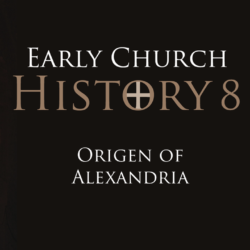This is part 6 of our holy spirit series.
Today we hear a new perspective on the manifestations of the spirit from Carlos Jiménez who stakes out what he calls an “evidentialist” position. He is neither a cessationist nor a continuationist, but someone who retains a certain level of skepticism towards reports of spiritual activity. His concern is to test the spirits to make sure they are biblically valid.

—— Links ——
- See more of Carlos Jimenez at Focus on the Kingdom website and YouTube channel
- For the paper referenced in this episode, see “A Brief History of Spiritual Gifts“
- See the previous podcasts in this series on the holy spirit
- If you’d like to support Restitutio, you can donate here.
- Leave a voice message via SpeakPipe with questions or comments
- Intro music: Good Vibes by MBB Attribution-ShareAlike 3.0 Unported (CC BY-SA 3.0) Free Download / Stream: Music promoted by Audio Library







Great program. My question would be is there a difference between the gift of tongues per 1 Cor. 12:10 as the Spirit wills (11:12) for the edification of the Body when accompanied with the interpretation of tongues (14:5), and what is the initial sign evidence of the individual’s Baptism in the Holy Ghost which appears to be speaking in an unknown tongue by the 5 accounts recorded in the book of Acts? I do agree there is blatant abuse among some causing disruption and confusion when a person is unable to control their own spirit during corporate worship and assembly. This confusion has caused many to forbid speaking in tongues (14:39) which leads to quenching the Spirit (1 Th5:19) in my opinion.
Keep up the great work.
Good job
I understood you fine. I think maybe I didn’t don’t know. The Carlos interview is somewhere near my view. Don’t get me wrong, I want the fullness of God, Just thinking the fruit is more important evidence than a gift, That is questionable .Keep up the good work,
Sean
Sean,
Thanks again for inviting me to talk to your audience.
Just to follow up on your comments at the end re: studies into glossolalia, here are 2 books I read:
“Speaking in Tongues” by Dr. Felicitas Goodman, an internationally accredited translator and interpreter.
“Tongues of Men and Angels” by Dr. William Samarin, Prof. of Anthropology and Linguistics, Univ. Toronto.
Linguist and professor William Samarin conducted a wide-ranging investigation of “tongues” in North America and Europe. He concluded:
“When the full apparatus of linguistic science comes to bear on glossolalia, this turns out to be only a facade of language — although at times a very good one indeed…[Tongues] always turn out to be the same thing: strings of syllables, made up of sounds taken from among all those that the speaker knows, put together more or less haphazardly but which nevertheless emerge as word-like and sentence-like units because of realistic, language-like rhythm and melody. Glossolalia is indeed like language in some ways, but this is only because the speaker (unconsciously) wants it to be like language. Yet in spite of superficial similarities, glossolalia is fundamentally not language” (Tongues of Men and Angels, p. 127-128, 227)
I’ve been following this series closely and have really enjoyed hearing the variety of positions that come along with this subject. In light of Carlos’ interview, I would really like to hear more dialogue on a certain point.
Without putting words in Carlos’ mouth, I got the sense that he would dismiss miraculous events based off the doctrinal positions the people in question may hold. He made comments that led me to believe he would dismiss alleged miracles performed by any Calvinist and any Trinitarian.
While I respect Carlos and the evidentialist position he outlined, I would really like to hear more discourse about which doctrinal camps you must fall into in order to have God work miraculously in your life. For example, must you be correct on every account? Are there certain doctrines that act as a minimum threshold before God will perform miracles through you (and if so, where do you draw the line)? Will God perform greater miracles the “more correct you are?” I may be wrong, but this scriptural correctness as a metric to determine the miracle’s authenticity seems to lie at the heart of his “test the spirits” position.
I’d be interested to hear which requirements Carlos and others would list in order to receive the gift of the Holy Spirit. Acts 2:38 seems to provide only two.
Levi,
Thank you for listening and for your thoughtful, well-laid out questions.
If we continue to read in 1 John 4 you will notice that the Apostle goes on to teach how to test the spirits.
In other words, by what they teach. And obviously said teaching(s) must line up with whatever Jesus and his Apostles taught, e.g., God is one Person, the Gospel is about the Kingdom, baptism into Christ for the remissions of sins, the human Son and not “God the Son,” etc.
The problem I see in legitimatizing people representing other systems, mainly triniatrianism, is confusion.
If God is approving false doctrines by the standards of scripture, isn’t that confusing?
That’s why I brought up Deut 13 where the test is not whether or not the prophet in question is preforming actual miracles. But the true test is in what they teach, i.e., “they lead you to other gods.”
Hope this helps,
carlos@thehumanjesus.org